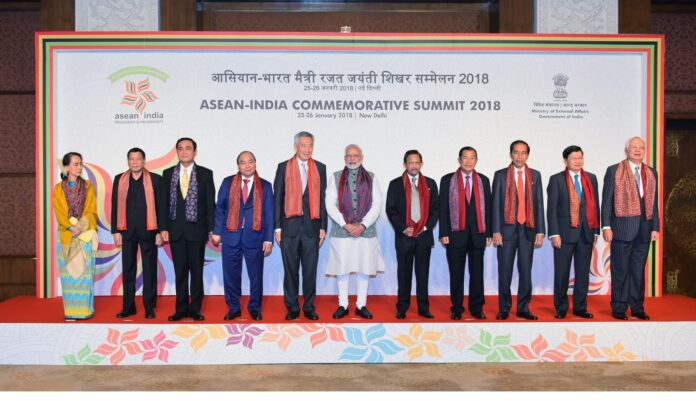Jakarta: Prime Minister Narendra Modi has established himself as a steadfast supporter of a rules-based international order in a world characterized by altering dynamics and global problems. In a recent speech, he emphasized India’s unflinching commitment to collaboration with ASEAN countries and the critical need to uphold international law at the ASEAN-India Summit and East Asia Summit held in Jakarta. Concerns regarding China’s aggressive behavior and territorial issues dominated these conversations.
A Post-COVID Rules-Based World Vision
Prime Minister Modi presented a proposal for a rules-based international system as the globe struggles to recover from the COVID-19 pandemic. He stressed that Asia is the rightful owner of the twenty-first century and that all countries must work together to establish a global system that places a high priority on cooperation and human welfare.
In his speech at the ASEAN-India Summit, Modi reiterated his conviction that a post-COVID world order, guided by laws and regulations that advance peace and development, is necessary. He declared with fervor, “This is our century. This calls for the development of a post-COVID world order based on laws and everyone’s commitment to advancing human welfare.
Concerns Regarding China’s Aggressive Behavior
China’s territorial assertiveness was one of the most important topics covered at both summits. China had published a contentious map in which it claimed sovereignty over territory that belonged to other countries. Several countries, including India, Japan, Indonesia, Malaysia, the Philippines, Vietnam, and Taiwan, expressed outrage and protested this action.
In response to this problem, Modi put up a 12-point plan at the ASEAN-India summit to improve relations between India and the ASEAN’s 10 members. He stressed the importance of keeping an open and free Indo-Pacific area as well as highlighting the voices of the Global South. Modi made it clear that India is steadfast in its resolve to work with all ASEAN countries to accomplish these shared objectives.
Resolution through Multilateralism and Diplomacy
Modi spoke directly to the crowd at the East Asia Summit, which also included Chinese Premier Li Qiang. He emphasized the need for complete adherence to international law as well as the importance of group commitment and coordinated measures to strengthen the sovereignty and territorial integrity of all nations.
Modi emphasized the importance of communication and diplomacy as the only workable avenues for resolution in a world where conflict is not the solution. In an increasingly unstable global environment, he highlighted that multilateralism and a rules-based global order are crucial tools for addressing problems like terrorism, extremism, and geopolitical disputes.
All for an Indo-Pacific
Modi went on to discuss the necessity for an Indo-Pacific region where UNCLOS (the United Nations Convention on the Law of the Sea) and other international law are applied uniformly to all nations. He demanded freedom of overflight and navigation and underlined the value of unhindered legal trade for the good of all parties.
Modi also expressed his support for the South China Sea Code of Conduct, which is currently being negotiated by China and the ASEAN nations. He emphasized that this code must be practical, adhere to UNCLOS, and take into account the interests of nations who are not directly involved in the debates.
How Important is the East Asia Summit?
Modi concluded by highlighting the East Asia Summit as the main vehicle for cooperation between leaders on important issues in the Indo-Pacific. He stressed its crucial function as Asia’s main instrument for fostering confidence.
In conclusion, India’s commitment to cooperate with ASEAN countries is amply demonstrated by Prime Minister Narendra Modi’s appeal for a rules-based global order. In order to maintain peace and stability in the Indo-Pacific area, it also emphasizes the critical necessity for international respect to laws and regulations.


